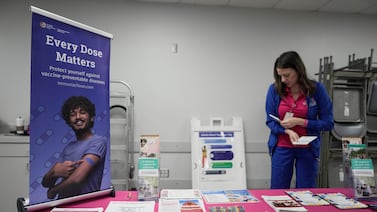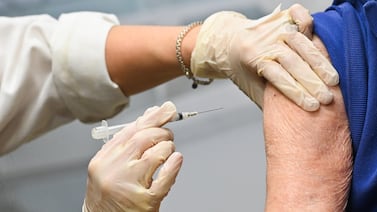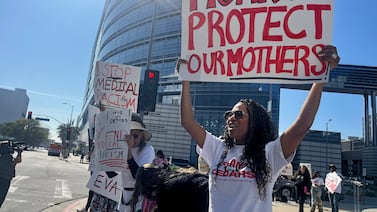Public health, explained: Sign up to receive Healthbeat’s free Atlanta newsletter here.
October is dedicated to spreading awareness about domestic violence, but it’s a public health problem with high risk year-round. In the United States, over 40% of women and a quarter of men experience physical violence or stalking from a romantic partner over their lifetimes, according to the Centers for Disease Control and Prevention.
While Georgia’s reported domestic violence rate decreased from 2022 to 2023, the city of Atlanta said there’s been an uptick in reports this year. Experts say many cases go unreported, making it hard to know how many people don’t have access to crucial help.
In the Atlanta metropolitan area, several resources are available for people experiencing a dangerous home environment. Here’s how to get help:
I or someone I know has experienced domestic violence. Where can we get help?
There are domestic violence shelters across Atlanta and surrounding cities, and Georgia’s Criminal Justice Coordinating Council requires all state-certified shelters to have around-the-clock crisis hotlines for victims of home violence. Additionally, a statewide hotline offers phone calls in a variety of different languages.
Kyra Hanlon-Batiste, director of community engagement at the Women’s Resource Center to End Domestic Violence in Decatur, said people can call these hotlines for any number of reasons — from being in the midst of a crisis to trying to figuring out if their experiences at home constitute domestic violence.
Whether someone is actively experiencing violence, has experienced harm at home or is in danger of being hurt, Hanlon-Batiste said all-hours hotlines are often the best places to start seeking safety.
“Folks may be experiencing violence at any time of the day, any day of the week, any week of the year,” she said.
If Georgia residents don’t know which hotline to call, they can call the state or national hotline, which make referrals to local shelters.
What types of help can domestic violence shelters offer?
In addition to running hotlines, family violence shelters certified by the state have to provide a variety of free services. Survivors are offered individualized safety plans, safe temporary living in locations away from anyone likely to endanger them, legal and need-based advocates, counseling, health care referrals, and child-specific aid.
Shelters only provide services if victims want them, and they’re required to operate in a way that prioritizes safety. There’s no maximum length of time people can live at the shelters, but shelters may have stay limits related to issues like bed availability.
Some shelters offer additional ways to help survivors of domestic violence. The Women’s Resource Center, for example, has a supervised visitation and exchange service to create a way for children to see their parents while protecting victims’ safety.
“We keep the whole family safe while honoring the fact that folks are capable of repairing harm and being committed to changing and growing,” Hanlon-Batiste said.
If a local shelter is full, advocates can find other local places that may offer safe living, refer people to shelters in other counties, or even temporarily place someone in a hotel room for a night or two — though that’s often a last resort.
Should I involve law enforcement?
While some victims of domestic violence call the police after an assault, advocacy groups say it can sometimes escalate a tense situation. The National Domestic Violence Hotline highlights that people experiencing abuse may have different comfort levels speaking candidly to law enforcement, and police may have biases that prevent survivors from being helped appropriately.
Some of those biases are reflected in a report authored by Georgia’s Commission on Family Violence earlier this year. Between 2018 and 2022, Georgia women, who were at higher risk of family assault than men in the state, were more likely than men to be arrested when police responded to domestic violence calls.
Hanlon-Batiste said for Atlanta city residents, the Policing Alternatives and Diversion Initiative offers de-escalation services five days a week. But for people outside the city, there aren’t comparable services. The police may be the only option for many metro Atlanta residents in immediate danger, but she said it’s important to consider the risks of involving law enforcement.
“Each survivor knows their own situation best,” she said.
24-hour domestic violence hotlines
- National Domestic Violence Hotline: 1-800-799-7233
- Georgia Statewide Hotline: 1-800-334-2836
- Clayton County Association Against Family Violence (Morrow): 1-770-961-7233
- LiveSafe Resources (Marietta): 1-770-427-3390
- Partnership Against Domestic Violence (Atlanta): 1-404-873-1766
- Project ReNeWal (Conyers): 1-770-860-1666
- Women’s Resource Center To End Domestic Violence (Decatur): 1-404-688-9436
Allen Siegler is a reporter covering public health in Atlanta for Healthbeat. Contact Allen at asiegler@healthbeat.org.






